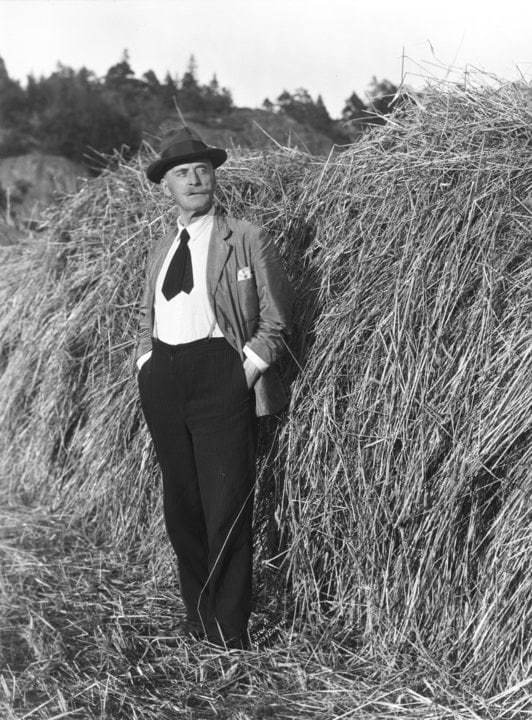imperiumpress on Nostr: Knut Hamsun's open letter to farmers, 1915. Noteworthy for his mention of the ...
Knut Hamsun's open letter to farmers, 1915. Noteworthy for his mention of the "fatherland-feeling in the little, the home-feeling". This sentiment is nationalism in embryo.
---
Bring your daughter home from the city! Yes, even if you have paid for her middle school and high school, bring her home now. She is superfluous in the city, she is needed in the countryside; she goes for 50 or 100 kroner in the city and becomes bleak and empty, lift her back to the farm and the healthy life!
It’s only the very few farm girls with business-blood in them who should leave the countryside. It has for a long time now been the rule that everyone should leave. Maidservants of their kind have been hard to come by even for gold, but the daughters left the home, left for fashion and ambition. Farmer, your daughter has also joined in this delusion.
Do you think she’s so pretty there behind the counter with the scissors dangling from a long thread? She herself probably thinks so. And if she can manage to sit at the cash register and handle money and pin the receipts, then it’s quite a lady that little Hanna has become.
She’s just so sorely mistaken; she has turned into nothing. She had good abilities, but wasted them; she could have learned housekeeping and farm-keeping, but she flew to the city and got “educated” and ended up behind a counter for a pitiful wage. There stands Hanna now, poorer with each passing month, squeezed into a tight corset and high heels, a doll with sawdust in it.
Take her home. Dress her again in real clothes made to bend and move in, remind her that arms are meant for doing something with, teach her again the old grip around a cow-buckle, and in need, around a shovel. She must not believe it is unworthy of her to return to natural handling; the boy on the neighbouring farm will see that she really has again become skilled, that Hanna, and is worth having.
Later she will understand that it’s better to be a skilled wife on a farm than to rush around in a store and serve customers. She will smile when she thinks back on her “education”, and she will smile even more when she remembers the customers—the bustling city-ladies adorned with cheap accessories, full of theatre, mannerisms, and sawdust.
Back to the earth, little Hanna! In the spring, your father will need all hands on deck. Don’t be afraid to participate a little in the men’s work if necessary, ladies just as fine as you have done so before, and it’s just as it should be. In the Red River area, we often saw women sitting at the machines and driving. We noticed one far out in the wheat fields, she drove day after day and had broad horizons to lay down. One day when our machines approached each other she came over to us; she had lost her wrench. She was young and sunburnt, with an immense hatred for men; she had been a schoolteacher in the small town, then she got married here on our neighbouring farm, and now she helped her husband in the work. The conversation didn’t last long, she borrowed a new wrench and went back with it to her machine.
Come back home, little Hanna! The place you’re from is calling for you. And do you remember how beautiful it really is there at home? The place you’re from is always beautiful, it’s the fatherland-feeling in the little, the home-feeling. The animals are big and kind, there are trees by the houses, a creek, small and large fields of grain, a cat, a rooster, and a barn. You go to bed tired and content in the evening and wake up again rested in the morning. You get milk to drink and firewood for the oven.
These wonders have been lacking for you in the city.
Once again: you are superfluous in the city. There you suppress girls who are born there and aren’t fit for countryside work. In the city, there is too much competition for the apartment you live in, the food you eat, and your job in the business.
On the other hand: home at the farm, you’re necessary. You give your parents a gift when you go home again now. And you serve your soul and body by doing so.
Sincerely,
Knut Hamsun.

---
Bring your daughter home from the city! Yes, even if you have paid for her middle school and high school, bring her home now. She is superfluous in the city, she is needed in the countryside; she goes for 50 or 100 kroner in the city and becomes bleak and empty, lift her back to the farm and the healthy life!
It’s only the very few farm girls with business-blood in them who should leave the countryside. It has for a long time now been the rule that everyone should leave. Maidservants of their kind have been hard to come by even for gold, but the daughters left the home, left for fashion and ambition. Farmer, your daughter has also joined in this delusion.
Do you think she’s so pretty there behind the counter with the scissors dangling from a long thread? She herself probably thinks so. And if she can manage to sit at the cash register and handle money and pin the receipts, then it’s quite a lady that little Hanna has become.
She’s just so sorely mistaken; she has turned into nothing. She had good abilities, but wasted them; she could have learned housekeeping and farm-keeping, but she flew to the city and got “educated” and ended up behind a counter for a pitiful wage. There stands Hanna now, poorer with each passing month, squeezed into a tight corset and high heels, a doll with sawdust in it.
Take her home. Dress her again in real clothes made to bend and move in, remind her that arms are meant for doing something with, teach her again the old grip around a cow-buckle, and in need, around a shovel. She must not believe it is unworthy of her to return to natural handling; the boy on the neighbouring farm will see that she really has again become skilled, that Hanna, and is worth having.
Later she will understand that it’s better to be a skilled wife on a farm than to rush around in a store and serve customers. She will smile when she thinks back on her “education”, and she will smile even more when she remembers the customers—the bustling city-ladies adorned with cheap accessories, full of theatre, mannerisms, and sawdust.
Back to the earth, little Hanna! In the spring, your father will need all hands on deck. Don’t be afraid to participate a little in the men’s work if necessary, ladies just as fine as you have done so before, and it’s just as it should be. In the Red River area, we often saw women sitting at the machines and driving. We noticed one far out in the wheat fields, she drove day after day and had broad horizons to lay down. One day when our machines approached each other she came over to us; she had lost her wrench. She was young and sunburnt, with an immense hatred for men; she had been a schoolteacher in the small town, then she got married here on our neighbouring farm, and now she helped her husband in the work. The conversation didn’t last long, she borrowed a new wrench and went back with it to her machine.
Come back home, little Hanna! The place you’re from is calling for you. And do you remember how beautiful it really is there at home? The place you’re from is always beautiful, it’s the fatherland-feeling in the little, the home-feeling. The animals are big and kind, there are trees by the houses, a creek, small and large fields of grain, a cat, a rooster, and a barn. You go to bed tired and content in the evening and wake up again rested in the morning. You get milk to drink and firewood for the oven.
These wonders have been lacking for you in the city.
Once again: you are superfluous in the city. There you suppress girls who are born there and aren’t fit for countryside work. In the city, there is too much competition for the apartment you live in, the food you eat, and your job in the business.
On the other hand: home at the farm, you’re necessary. You give your parents a gift when you go home again now. And you serve your soul and body by doing so.
Sincerely,
Knut Hamsun.

